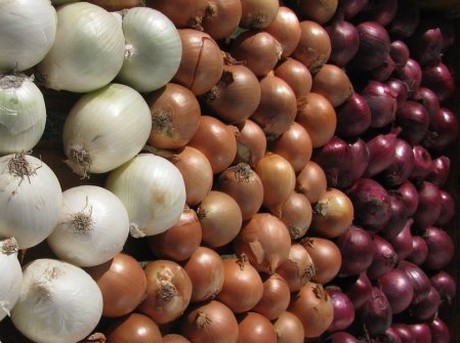 prominent in Argentina. Onions have managed to supply the domestic market and be positioned worldwide as a culinary product of good taste and high quality. The country has a 1.5% share of the world's onion production.
prominent in Argentina. Onions have managed to supply the domestic market and be positioned worldwide as a culinary product of good taste and high quality. The country has a 1.5% share of the world's onion production.This accounts for its position as a world reference with an annual production of about 450,000 tons. The environmental benefits that Argentina has for the production of this food have increased the expectations regarding their participation in the external market.
Argentina is the largest producer and exporter of dehydrated onion in Latin America and has an average per capita consumption of fresh onion of ten kilos per year. The domestic market's demand is fully supplied by domestic production.
Onion seed supply is also covered mostly by domestic production, with a demand that ranges between 120 and 150 tons.
"The work done by SENASA in this regard has been key, since it regulates the activity of packaging and checks that producers comply with Good Manufacturing Practices (GMP) and other international standards, making it possible for the country to process large volumes safely and efficiently," said the agency's president, Diana Guillen.
Argentina ships to more than 30 world markets. During 2013, onion exports accounted for 39% of all the vegetable exports, establishing itself as the country's main vegetable export. Exports amounted to 229,672 tons, i.e. 52% more than in 2012.
The main destinations were Brazil with 216,907 tons (94.4%); Paraguay, with 6,330 tonnes (2.8%), and Uruguay, with 4,339 tonnes (2%). Although Brazil is the main export destination, there has been an increase in demand from European countries in recent years, especially Spain and Belgium.
Mercosur has a technical regulation to identify onions and their quality, which sets their sizes (according to their transverse diameter), type (extra, special or selected, and commercial), a description of the product's defects (thick stem, sprouting, rotting) and their packing, storage, transport, and labelling conditions. SENASA is in charge of enforcing this law.
The main exporting provinces during 2013 were Buenos Aires with 196,202 tons; Rio Negro, with 24,254 tons, and Mendoza, with 7,805 tons. These areas have adequate logistics and their packaging facilities' staffs are trained on issues related to product quality and workplace hazards.
Onions are cultivated throughout the country and occupy over 20,000 hectares. The country cultivates short, intermediate and long varieties, which are intended for fresh consumption and the industry.
The cultivated area has increased by 70% in the last decade, driven largely by rising domestic consumption and exports.





